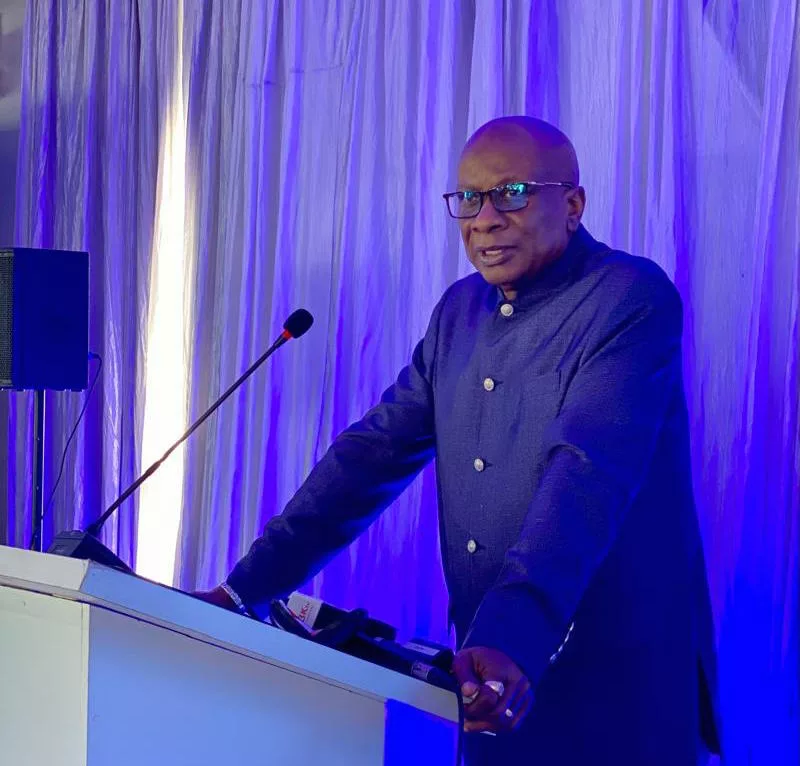|
Getting your Trinity Audio player ready...
|
The United Nations Resident and Humanitarian Coordinator, His Excellency Edward Kallon, in his remarks at the United Nations Development Programme (UNDP) Zimbabwe Country Programme Document (CPD) Mid-Term Stakeholders Consultative Meeting today, Thursday 16 May 2024, bemoaned the slow progress towards the attainment of Sustainable Development Goals (SDGs) targets.
“As we approach the mid-point of the 2030 timeline, progress towards the SDGs is lagging behind, with only 15% of targets on track. Immediate action is required to accelerate progress and integrate economic models, policies, and investments with the SDGs. The outlined six transitions, encompassing food systems, energy access, education, digital connectivity, employment and social security, and climate action based on the 17 SDG framework provide a roadmap to accelerate implementation of the SDGs and investment pathways.
“Effectively executing these transitions necessitates innovative financing, governance, and integrated transformative policy frameworks. In this regard, the UN’s reforms position the organization favorably to support Zimbabwe in supporting and accelerating implementation of the SDGs,” HE Kallon said.
He appaluded the vital partnership between the United Nations Development Programme (UNDP) and its broad impact across the United Nations system, working together to support the Government of Zimbabwe in achieving its national development priorities and achieving the 2030 Agenda for Sustainable Development.
Collaboratively, the UN Development System in Zimbabwe is guided by the 2022-2026 Zimbabwe UN Sustainable Development Cooperation Framework, within which the UNDP Zimbabwe Country Programme Document (CPD) for 2022-2026 is developed and aligned to the Zimbabwe’s National Development Strategy 1 (NDS1) for the period 2021-2025.
The UNDP CPD is a crucial element of the UN’s commitment to supporting Zimbabwe in achieving the 2030 Agenda for Sustainable Development. This mid-term review comes at an opportune time as it coincides with the UN support to Zimbabwe in localizing the Summit of the Future and supporting the government to embed the six transitions into the nation’s development priorities and vision to become a upper middle-income society by 2030 and accelerating progress towards the realization of the 2030 Agenda for Sustainable Development and its 17 goals.
The interconnected nature of these goals underscores that progress in one sector can catalyze advancements in others. To effectively meet the Sustainable Development Goals (SDGs), an integrated policy approach is critical. Contrastingly, prevalent isolated approaches in development often lead to disjointed strategies and processes that impede SDG alignment.
HE Kallon said the impending Summit of the Future in September 2024 presents a substantial occasion to tackle global challenges and enhance multilateral cooperation towards sustainable development goals.
“The forthcoming Pact for the Future, a summit outcome, will spotlight key areas such as sustainable development, peace, innovation, youth, and global governance, providing a pivotal juncture for the UNDP’s CPD mid-year review to integrate and reflect as we collaborate as the UN Development System towards embracing an ambitious Pact,” he said.
HE Kallon said the NDS1 marks a significant stride towards actualizing Zimbabwe’s Vision 2030, aimed at elevating Zimbabwe into an upper middle-income society. The CPD underpins this vision by aligning its priorities with the operational framework of NDS1, ensuring that UN initiatives support the government’s efforts in achieving sustainable and inclusive growth.
The CPD is intricately tailored to support NDS1’s core priorities encompassing economic growth, human capital development, environmental preservation, and good governance.
“Our shared aim is to nurture a thriving and empowered Zimbabwe, leaving no individual marginalized. The UNDP’s strategic blueprint pivots on resilience—of both the populace and the systems servicing them.”
He added that the CPD strives to fortify community and institutional resilience, drawing on insights from initiatives like the Zimbabwe Resilience Building Fund (ZRBF). UN endeavors span healthcare systems, amplifying HIV treatment, and supporting the national COVID-19 response and laying the foundation for a robust and resilient healthcare sector for future shocks.
On the other hand, its commitment to environmental sustenance remains steadfast. Aligned with NDS1’s emphasis on environmental safeguarding and climate resilience, the CPD champions renewable energy, sustainable agriculture, and climate-resilient infrastructure to foster economic advancement while preserving ecological assets. This holistic approach champions a sustainable equilibrium between people, the planet, and prosperity.
Nurturing equitable and sustainable economic growth is pivotal to the UN strategy. The CPD nurtures the development of small and medium enterprises (SMEs), fosters rural-urban linkages, and advances market access for local goods. The UN isd resolute in embedding gender and disability considerations in economic policies to ensure all Zimbabweans reap the benefits of economic prospects.
As enablers to deliver development results and inclusive economic growth, Governance and Institutional Strengthening is critical for sustainable development. The CPD supports governance reforms directed at enhancing transparency, accountability, and inclusive governance structures. Active collaboration with national and subnational entities aims to fortify public sector management, bolster electoral processes, and uphold the rule of law and human rights.
Robust monitoring and evaluation mechanisms are in place to track progress, ensuring alignment with NDS1 and the Sustainable Development Goals (SDGs). By embracing data-driven strategies and involving a diverse set of stakeholders, the CPD ensures effective implementation and impact evaluation.
The success of the CPD depends on a robust partnership with the government, civil society, private sector, and global partners. These collaborative endeavors are critical to mobilize resources, share expertise, and steer sustainable development initiatives benefiting all Zimbabweans.
“Together, we can achieve more, shaping a brighter future for Zimbabwe. Our partnership with the Government of Zimbabwe under the Cooperation framework, which is operationalized through UNDP’s CPD, and other UN entities strategic programme documents epitomizes our shared dedication to sustainable development and the wellbeing of all Zimbabweans. Aligned with NDS1, we are collectively propelling towards a prosperous, resilient, and inclusive Zimbabwe. Let’s forge ahead hand in hand to realize this vision, guaranteeing no one and no place is left behind,” HE Kallon added.






